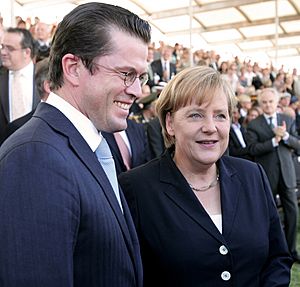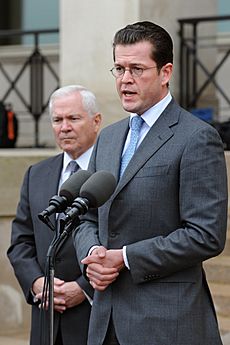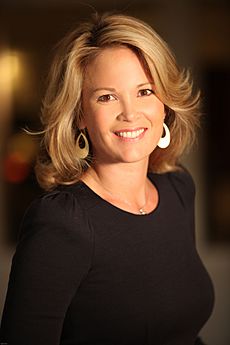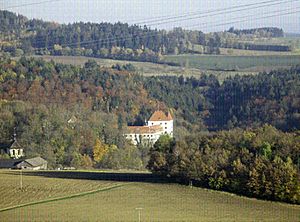Karl-Theodor zu Guttenberg facts for kids
Karl-Theodor Maria Nikolaus Johann Jacob Philipp Franz Joseph Sylvester Buhl-Freiherr von und zu Guttenberg (born 5 December 1971), known as Karl-Theodor zu Guttenberg, is a German businessman, journalist, and podcaster. He used to be a politician with the Christian Social Union (CSU) party. He was a member of the German Parliament (Bundestag) from 2002 to 2011. He also served as the Secretary-General of the CSU, and as a government minister, first for Economics and Technology, and then for Defence.
After some issues with how he wrote his university paper, which led to his special university degree being taken away, he decided to leave politics in March 2011. Since then, he has worked in business and media.
Quick facts for kids
Karl-Theodor zu Guttenberg
Bundesminister a. D.
|
|
|---|---|
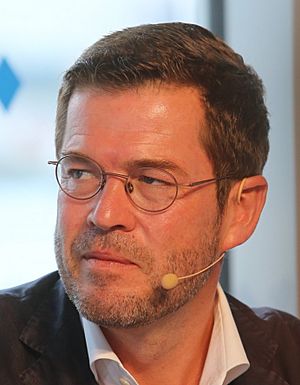
Guttenberg in 2017
|
|
| Minister of Defence | |
| In office 28 October 2009 – 1 March 2011 |
|
| Chancellor | Angela Merkel |
| Preceded by | Franz Josef Jung |
| Succeeded by | Thomas de Maizière |
| Minister for Economic Affairs and Technology | |
| In office 10 February 2009 – 27 October 2009 |
|
| Chancellor | Angela Merkel |
| Preceded by | Michael Glos |
| Succeeded by | Rainer Brüderle |
| Secretary General of the Christian Social Union | |
| In office 3 November 2008 – 10 February 2009 |
|
| Leader | Horst Seehofer |
| Preceded by | Christine Haderthauer |
| Succeeded by | Alexander Dobrindt |
| Member of the Bundestag for Kulmbach |
|
| In office 17 October 2002 – 3 March 2011 |
|
| Preceded by | Bernd Protzner |
| Succeeded by | Emmi Zeulner (2013) |
| Personal details | |
| Born |
Karl-Theodor Maria Nikolaus Johann Jacob Philipp Joseph Sylvester Buhl-Freiherr von und zu Guttenberg
5 December 1971 Munich, Bavaria, West Germany (now Germany) |
| Political party | Christian Social Union |
| Spouse |
Stephanie zu Guttenberg
(m. 2000; div. 2025) |
| Domestic partner | Katherina Reiche |
| Children | 2 |
| Parents |
|
| Alma mater |
|
| Signature |  |
| Military service | |
| Allegiance | |
| Branch | |
| Service years | 1991–1992 |
| Rank | Stabsunteroffizier der Reserve |
| Unit | |
Contents
Education and Early Career
After finishing high school in 1991, Karl-Theodor zu Guttenberg completed his required military service in the German army. He became a sergeant.
University Studies
He then studied law at the University of Bayreuth. In 1999, he passed his first major law exam. Instead of taking a second exam to become a lawyer, he chose to manage his family's businesses and investments.
In 2007, he earned a special university degree called a Doctor of Law from the University of Bayreuth. However, later on, it was found that parts of his paper were not properly credited. Because of these issues, the university decided to take back his degree in 2011. In 2019, he earned another special university degree, a Doctor of Philosophy, from the University of Southampton in the UK.
Political Journey
Karl-Theodor zu Guttenberg is a member of the Christian Social Union of Bavaria (CSU), a political party in Germany. He held several important roles within the party.
Member of Parliament
In 2002, he was elected to the Bundestag, which is the German Parliament. He represented the area of Kulmbach. He was re-elected in 2005 and 2009, winning a very high percentage of votes in his district.
From 2005 to 2008, he was a leader in the Parliament's Foreign Affairs Committee. He also spoke for his party on topics like disarmament and arms control.
Political Views
Guttenberg believed that Turkey should have a special partnership with the European Union instead of becoming a full member. He thought this because of some disagreements, like the Cyprus dispute.
He also worried about Iran's nuclear plans. He wanted countries to work together peacefully to deal with this issue. He was a strong critic of the far-left party "Die Linke." He was also involved with groups that promote European unity and remember the victims of the Holocaust.
Secretary General of the CSU
In 2008, the CSU party lost many votes in a state election. Because of this, the party leaders changed, and Karl-Theodor zu Guttenberg became the secretary general of the CSU. In this role, he pushed for ideas like tax cuts and more support for families.
Federal Minister of Economics
In February 2009, Guttenberg became the Minister for Economics and Technology. He was the youngest person to hold this job in Germany after World War II. He took office during a time when the world economy was struggling.
He was careful about using government money to save banks and companies. He believed that companies should try to fix their own problems first. For example, when the car company Opel needed help, he insisted that its parent company, General Motors, provide a clear plan for its future. He became very popular during this time.
Federal Minister of Defence
After the 2009 elections, Guttenberg became the Minister of Defence. He was the youngest German defence minister ever.
German Soldiers in Afghanistan
One of his first challenges was dealing with an airstrike in Kunduz, Afghanistan, that had caused civilian deaths. He took responsibility for mistakes made by his department regarding this event. He also openly said that German soldiers in Afghanistan were in a "war" situation. This was a big change, as previous leaders had called it a "stabilization deployment." This new way of describing it helped improve the legal status and support for German soldiers.
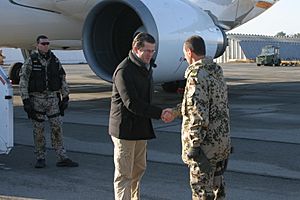
He visited German soldiers in Afghanistan many times to understand their situation. He also created a special medal for soldiers who showed bravery in combat. He believed that Germany should not pull its troops out of Afghanistan too quickly.
Military Reform
In 2010, Guttenberg started major reforms for the German military (Bundeswehr). His main goal was to make the army more effective and save money. He proposed reducing the number of active soldiers and ending the mandatory military service for young people. This was the biggest change to the German military since it was founded in 1955. His ideas were approved, and mandatory military service was suspended.
University Paper Issues and Resignation
In 2011, problems were found with the university paper (his doctoral dissertation) that Karl-Theodor zu Guttenberg had submitted to the University of Bayreuth. It was discovered that parts of his paper contained text from other sources that were not properly mentioned or cited.
At first, he said the accusations were "absurd" but later admitted he might have made mistakes in his footnotes. He apologized in Parliament for the flaws in his paper. On 23 February 2011, the University of Bayreuth officially took back his special university degree.
Because of the strong criticism from academics and politicians, Guttenberg announced his resignation as Minister of Defence and from all his political roles on 1 March 2011. Later, a university committee concluded that he had intentionally included borrowed passages without proper citation.
Life After Politics
After leaving politics, Karl-Theodor zu Guttenberg moved to the United States. In 2011, he joined the Center for Strategic and International Studies (CSIS), a research organization in Washington D.C.
In 2011, he also published a book called Vorerst gescheitert (which means "Failed for Now"). In this book, he talked about his political career and why he resigned.
Since 2013, he has been involved in business. He started his own consulting and investment company called Spitzberg Partners LLC. He also advises other companies, including Deutsche Lufthansa, on new ideas.
Guttenberg is a strong critic of Vladimir Putin and Russia's foreign policy. He has spoken about the importance of strong leadership in the world.
In recent years, he has also worked in media. In 2022, he signed a contract with RTL Television and made a documentary about Vladimir Putin. Since 2023, he has co-hosted a weekly podcast called "Gysi gegen Guttenberg – Der Deutschland-Podcast."
Family and Personal Life
Karl-Theodor zu Guttenberg comes from the House of Guttenberg, a very old family that has been documented since 1158. His family was given the title of "baron" in 1700. In Germany, noble titles are now part of a person's name, not a special privilege.
His grandfather, Karl Theodor Freiherr von und zu Guttenberg, was also a politician. During World War II, his grandfather bravely refused to harm innocent people. Other family members also resisted the Nazi regime.
Karl-Theodor zu Guttenberg was born in Munich. He used to live at his family's castle in Guttenberg, Bavaria, which has been owned by his family since 1482. In 2011, he bought a house for his family near New York City.
His father, Enoch zu Guttenberg, was a famous conductor who won many awards for his classical music. His mother, Christiane zu Eltz, is from another important family. His parents divorced when he was young, and he grew up with his father.
In 2000, Guttenberg married Stephanie zu Guttenberg, who is a great-great-granddaughter of Otto von Bismarck, a very important figure in German history. They have two daughters. In 2023, they announced their separation, and their divorce was finalized in April 2025. Karl-Theodor zu Guttenberg is Catholic. Since 2024, he has been in a relationship with Katherina Reiche.
Awards and Recognition
- In 2009, he received the "Politikaward," an award for the German "Politician of the Year."
- In 2010, the German news magazine Focus named him "Man of the Year."
Images for kids
See also
 In Spanish: Karl-Theodor zu Guttenberg para niños
In Spanish: Karl-Theodor zu Guttenberg para niños


